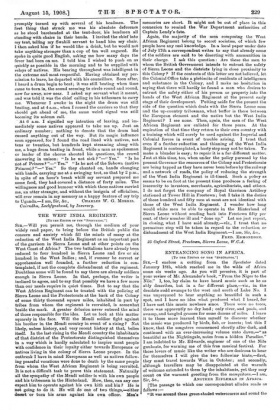THE WEST INDIA REGIMENT.
[TO THE EDITOR or THE "SPECTATOR.1 BM-Will you permit me, through the medium of your widely read paper, to bring before the British public the concern and anxiety which fill the minds of many at the reduction of the West India Regiment as an important part of the garrison in Sierra Leone and at other points on the West Coast of Africa ? The two battalions have already been reduced to four hundred in Sierra Leone and, five or six hundred in the West Indies ; and, if rumour be correct or apprehension well founded, a further reduction is con- templated, if not the complete disbandment of the regiment. Doubtless some will be found to say there are already soldiers enough in Sierra Leone. In. that, perhaps, the writer is inclined to agree, and to-say that possibly we have a few more than our needs require in quiet times. But to say that the West African Regiment can be trusted with the policing of Sierra Leone and the Protectorate at the back of the Colony of some thirty thousand square miles, inhabited in part by tribes from whom the regiment is recruited, is somewhat beside the mark. A greater delusion never entered the mind of those responsible for the idea. Let us look at this matter squarely in the face. Will the Mendi soldier fight against his brother in the Mendi country in event of arising ? Not likely,- unless history, and very recent history at that; belies itself. In the last rising in the Mendi country the inhabitants of that district of the Protectorate distinguished themselves in a way which is hardly calculated to- inspire 'most people with confidence in their loyalty either towards Europeans or natives living in the colony of Sierra Leone proper. In the outbreak I have in mind Europeans as well as natives follow- ing peaceful vocations were done to death by the same-people from whom the West African Regiment is being recruited., It is not a-difficult task to prove this statement. Naturally all the sympathy of the Mendi 'soldier is with his own people and his tribesmen in the Hinterland. How,' then, can any One expect him-to operate against 'his .own kith and kin ? He is not going to do it: He will' do one of twO things,–.either desert 'or turn his arms against his own officer. Men's
memories are short. It might not be out of place in this connexion to remind the War Department authorities of Captain Lendy's fate.
Again, the majority of the . men composing the West African Regiment belong to secret societies, of which few people have any real knowledge. In a local paper under date of July 17th a correspondent writes to: say that already some of the soldiers are said to be deserting with ammunition in their charge. I ask this (petition : Are these the men to whom the British Government intends to entrust the safety of Sierra Leone and the districts- lying in close proximity-to this Colony P If the contents of this letter' are riot believed, let the Colonial Office fake a plebiscite of residents of intelligence and substance in the Colony, and I make no. hesitation in saying that there will, hardly be found a man who desires to entrust the safety either of his person or property into the bands of the West African Regiment at the present early stage of their development. Putting aside for the present the side of the question which deals with the Sierra Leone man and the up-country tribesman, what buffer is there between the European element and the native but the West India Regiment? I see none. Then, again, the men of the West African Regiment are enlisted fer three years. At the expiration of that time they return to their own country with a training which will surely be used against the Imperial and Colonial forces in event of trouble arising. I trust that even if a further reduction and thinning of the West India Regiment is contemplated, a hasty step may not be taken. To make a blunder is easy ; to repair it is a far .different matter. Just at this time, too, when under the policy pursued by the present Governor the resources of the Colony and Protectorate are being tapped as they have never been before by the railway and a network of roads, the policy of reducing the strength of the West India Regiment is ill-timed. Such a policy as seems to be on foot at the present time produces a feeling of insecurity to investors, merchants, agriculturists, and others. I do not forget the company of Royal Garrison Artillery stationed at Tower Hill in Freetown; but I take it the duties of these hundred and fifty men at most are not identical with those of the West India Regiment. I wonder how long would white men be able to operate in the Hinterland of Sierra Leone without sending back into Freetown fifty per cent, of their number ill and "done up." Let me just repeat, in closing, what I have said already,—viz., I trust that no premature step will be taken in regard -to the reduction or dishandmentof the West India Regiment. —I am, Sir, &o.,
FRED. EDMONDSON.
25 Oxford Street, Freetown, Sierra Leone, W.a.d.






































 Previous page
Previous page